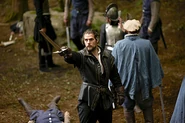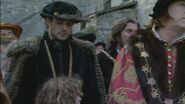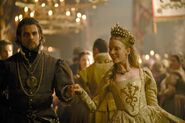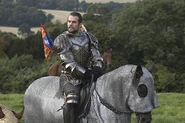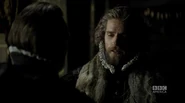"I've always been drawn to a saying used by the French peasants: 'Praise the God of All, drink the wine, and let the world be the world.'" -Charles Brandon.
Charles Brandon was the closest friend and loyal ally of King Henry VIII. Apart from Henry himself, Charles is the only character to appear in every episode in the series. In both the series and in real life, Charles is perhaps the only person who successfully retained Henry VIII's affection for over forty years. The first Duke of Suffolk, Charles jointly held the position of President of the Privy Council with the Duke of Norfolk at the end of Season One. Although it is unclear whether Charles still holds this position in subsequent episodes (as he is banished from court several times), he continues to serve on many of Henry's council meetings and frequently serves as one of the King's top military commanders. Of all of the characters in the series, his storyline is probably the most fictitious, as only a little of Brandon's real life is seen here.
Charles once disobeyed Henry by marrying his sister, Princess Margaret Tudor, but he learned from this mistake and always did the king's bidding no matter what was asked of him - even if his own orders horrified him. Charles was initially a rather immature and sexually deviant man, but he became more mature and just-natured as he grew accustomed to the power Henry bestowed on him; despite always considering Henry a friend, he becomes increasingly disillusioned and upset with the bloody events of Henry's reign, and while unwilling to criticize his friend and king in public, he eventually acknowledged to himself that Henry was chiefly to blame.
Charles played an important role in the downfall several key figures of Henry's court; such as Cardinal Wolsey, sir Thomas Cromwell, queen Anne Boleyn and her family, although historically he was not so deeply involved. He was usually referred to as "your grace" or "Suffolk" in court (although some of his rivals derisively called him "Brandon") but the king, Margaret Tudor and Catherine Brooke always called him by the name of Charles. He is portrayed by English actor Henry Cavill from seasons 1-4.
Season 1[]
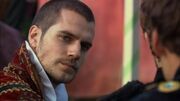
Charles Brandon, now duke of suffolk.
Charles Brandon, the 1st Duke of Suffolk, is King Henry's best friend, having fought alongside him in battle and grown up together; he is not of noble blood, but Henry bestows him with his dukedom in Episode 1.03 before he is to escort Princess Margaret to marry the King of Portugal, to Charles' astonishment. They are mutual friends with two other low-born men, William Compton and Anthony Knivert (both of whom later gain knighthoods) and are resented by nobles such as the Duke of Buckingham and the Duke of Norfolk for being "new men". He and Princess Margaret Tudor attack each other but are clearly attracted to one another.
Charles is caught having sex with the Duke of Buckingham's daughter in the first episode (Henry previously wagered him a hundred crowns that he couldn't seduce her), and as he leaves he implies that Buckingham's daughter already wasn't a virigin, confident that Henry won't punish him despite the Duke's fury. Charles is initially mocked by William and Anthony because he doesn't show them any favors through his new power; Charles returns their insults casually, since he is unaccustomed to his newfound position and prefers to idle in his wealth rather than actually become involved in court politics.
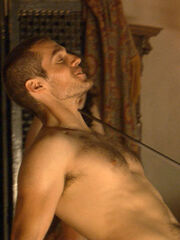
Charles is threatened by the Duke of Buckingham.
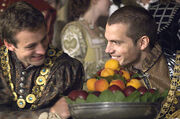
Charles with his friend, Anthony Knivert.
Margaret kills her new husband so that she can be with Charles (whom she had sex with on the voyage to Portugal in Episode 1.04). They marry impulsively after he proposes, although he requests that William Compton tell Henry. However, when Margaret reveals this to the King when they return to England, he is furious and banishes them both from court, because they neither asked his permission (which he would have probably refused) nor asked his forgiveness for marrying without his consent. Staying at his estate by themselves, Margaret drunkenly yells at Charles, saying if it weren't for him she'd still be the Queen of Portugal, asking, "and now what am i?". Charles responds by saying she is drunk and foolish, before they begin having sex. Charles is only seen having two affairs but the Queen of France implies he has had more. She refuses to sleep with him after he hits on her, calling him out on his unfaithful nature.
Henry eventually grants Charles an audience in episode 1.06, telling him to beg; after gritting his teeth, Charles drops his pride and literally begs for Henry's forgiveness. Henry then challenges him to an arm wrestling competition, telling him he can return to court if he wins. Scared of provoking Henry (who goes into a rage whenever he loses at anything) Charles at first holds back, but finally beats Henry, who punches the table in frustration and then says "Welcome back". As Henry leaves, Charles laughs quietly in relief, realizing Henry just wanted to scare him into total obedience. Although he is returned to court, he continues to ignore the politics, despite Margaret urging him to break off his association with the ruthless Lord Thomas Boleyn of Rochford. Charles admits he doesn't like Boleyn, but sees their alliance as a "marriage of convenience" to keep his and Margaret's fortunes intact, which Margaret cynically compares to their own marriage. Charles tries to protest that he loved her, but Margaret indicates she knows he is unfaithful. In episode 1.07, Charles (along with Henry and Anthony Knivert) is saddened when their mutual friend William Compton dies of the sweating sickness.
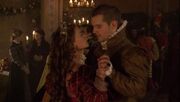
Charles with his first wife, Margaret.
Margaret later dies of consumption (tuberculosis) and Charles doesn't seem upset, but the King is furious with him for not even telling him that Margaret was sick, although he does not banish him again. However, we see later on in this episode, episode 9, we see Charles does in fact love her and always will until he dies , while he sniffs and tears up by Margaret's coffin. He then bursts into tears, saying, "i'm sorry. Forgive me". He feels extreme guilt for having sex with another woman while Margaret was dying.
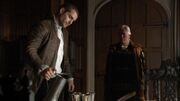
Charles meets with lord Thomas Boleyn.
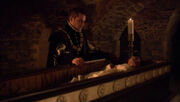
Charles mourning at Margaret's deathbed
In the final part of the series, despite his growing dislike of the Boleyn family, Charles allies with Thomas and George Boleyn, Thomas Cromwell and the Duke of Norfolk against a man he detests even more - Cardinal Wolsey. This is partly because the Boleyn family, who are gaining influence, promised to restore Charles to the King's favor and allow him to return to Court; Norfolk and Boleyn arranged the audience with Henry that allowed him to return. The coalition successfully strips Wolsey of his power in episode 1.09, replacing him under King Henry as the next greatest power in England. The Dukes of Suffolk and Norfolk are jointly appointed as Presidents of the Council, while Thomas Boleyn is made Lord Privy Seal. Charles leaves most of the government work to the more experienced Norfolk, preferring to go back to his indulgent lifestyle in the country with Anthony and his new ward, Catherine Brooke.
When Norfolk warns Charles in the Season finale that Wolsey may find a way to return to power, Charles is unconcerned- until Henry grows angry with the council's ineffectiveness, and threatens to reinstate the Cardinal. In the Season finale, Charles smugly arrests Wolsey on charges of treason, finally bringing about Wolsey's doom. However, Charles soon abandons the alliance with Norfolk and the Boleyns, distasteful of Lord Boleyn's devious actions and his daughter Anne's relationship with Henry - as well as still grieving for Margaret.
Season 2[]
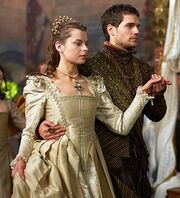
Charles Brandon and his second wife, Catherine.
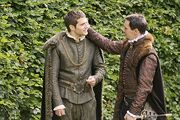
Charles and Henry, Season Two
Charles appears again in the second season, a main character. He has taken a new wife, Catherine Brooke, and promises to be faithful to her, telling her, "to you, i will always be true". He is forced to bring a lot of bad news to Catherine, saying, "forgive me", despite it not being his fault at all. Another woman arrives at court and Charles kisses her, but feels guilt, as he is married. Henry asks Charles if women have ever lied to him about their virginity. When Charles responds inappropriately and says that women always lie about that, an awkward silence ensues and he aplogizes. Henry shrugs it off, saying he asked for the truth and that's what Charles told him. Charles eventually breaks his promise to be faithful in episode 2.06, but immediately regrets it and begs his wife's forgiveness. Catherine adopted Charles' young son Edward (born by Margaret), and by 2.06 they are expecting a child of their own. While he obediently carries out Henry's rather harsh demands, Charles clearly has sympathy for Catherine of Aragon, telling his wife "it's like a thing of another world to watch her courage." He is also alarmed by the execution of Sir Thomas More, which he attends in episode 2.05.
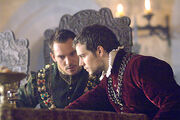
Charles with Henry (season 2).
Charles runs afoul of Henry's temper again in episodes 2.02- 2.03; firstly, he privately tells Henry that Anne Boleyn is suspected of promiscuity with Thomas Wyatt; secondly, he shows up late for Henry's wedding to Anne, and thirdly he fails to catch an assasin at her coronation, an event where he is supposed to be in charge of the guardsmen. Charles obviously hates Anne Boleyn and frequently calls her a whore, although never to her face. His hatred of Lord Thomas Boleyn of Rochford runs even deeper despite the two of them having joined forces in Season One, especially after one of Rochford's squires accosts and murders a knight in Charles' service over a supposed remark about Anne. The Boleyns are perfectly aware of his hostility, however, and respond by convincing Henry to banish Charles from court. Both Charles' wife Catherine and Thomas Cromwell advise him to store up his anger for when the moment is right; when Henry later calls him back as his marriage with Anne deteriorates, Charles is happy to disparrage her.
In episode 2.07, Charles unwittingly helps Henry meet his next wife, Jane Seymour, when he suggests they stop at her father's home, Wolf Hall, after a hunt. In episode 2.09 he remarks that rumors of the Queen's flirtatious behavior have been running rampant, spurring Henry to make Cromwell investigate Anne's household. He later arrests Anne herself on Henry's orders and escorts her to the Tower of London; Anne comes quietly, but continues to insist she is innocent, to which Charles answers with cold silence.
However, when Queen Anne is sentenced to death, Charles feels bad for her, and despite their mutual emnity, he doesn't believe she deserves to die. He is enraged when he discovers the degree of her father's indifference so long as he survives; he manhandles Thomas Boleyn, asking if acquiring temporary power was worth George and Anne's deaths, as well as his own permanent disgrace. As the Boleyn's position of prestige is destroyed, Charles emerges from the bloody power struggle unharmed and still in the King's favor - although he is no happier with the result, for the true winner is the unscrupulous Cromwell. Charles doesn't seem to know what to make of Cromwell; who steadily gains power as Season Two progresses- but, while admiring his cunning, he clearly doesn't like or trust him.
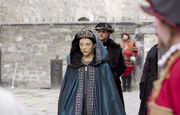
Charles escorts Anne Boleyn to the tower.
Charles' son Edward plays with a sword in episode 2.10, knocking over several items and furniture in Charles' and his wife's house, and Charles plays dead to scare his son. He suddenly jumps up, saying "Rah!" He tells his son that a sword is not a toy, and when questioned on whether he has ever killed someone, he says he has, in battle. He reluctantly brings his son to Queen Anne's execution at Edward's request and hears her final words; eventually, even he kneels and joins the crowd in praying for his former enemy, surprised by her dignity and bravery.
Season 3[]
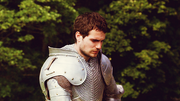
Charles' remorse for his war crimes against the north.
Charles has an equally prominent role in the third season. It can be inferred that he too was fond of Henry's third wife Jane Seymour, as most members of the court were. He does lead the Royal Army in an attempt to halt the Northern Rebellion (known as the Pilgrimage of Grace) in early episodes despite Catherine's concern for his safety, but then negotiates with them on Henry's behalf. However, although he sympathizes with them and shares their hope of displacing Thomas Cromwell, he is really just stalling with a truce until the Royal Army is strong enough to crack down on them. When a second, minor uprising occurs, Charles puts it down with force, launches mass arrests and hangs most of the leaders apart from Lord Darcy and Robert Aske; this is not enough, however, for Henry or Cromwell, who order Charles to carry out tenfold reprisals, to his horror and anger. Charles shows deep remorse and post-traumatic stress over the subsequent massive civilian-killings he is ordered to commit in reprisal for the rebellion, and this causes some rifts in his relationship with his wife Catherine. When Catherine becomes pregnant and later miscarries the child, Charles suspects she had an abortion because she felt upset with him over the deaths of Northern children during the reprisals.
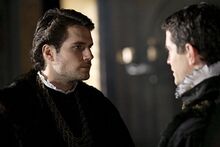
Charles speaks with Thomas Cromwell (right), his arch-rival and enemy
During several subsequent episodes in Seasons Three and Four, Charles sees hallucinations of some of the Northern leaders who were executed. His regret over these reprisals renews his hatred of Thomas Cromwell, and he begins opposing him openly at Privy Council meetings. After Queen Jane's death, when Henry's grief leaves the Kingdom without governance, Charles capitalizes on Cromwell's inability to keep order, and helps block his power by forming a new, temporary coalition with Bishop Stephen Gardiner and Edward Seymour. Nonetheless, when Henry's ulcerous leg puts his life in danger, he lays aside his feud with Cromwell temporarily. He also instructs a detachment of guards to protect Princess Mary Tudor with their lives, knowing that if Henry dies some will claim his son Edward as the heir, while others will claim her.
Although Charles never does anything directly to anger the King, Henry alternates between rage and praise for him, depending on events concerning the Pilgrimage of Grace. Later in the season he is called on to escort the King's newly betrothed, Lady Anne of Cleves, to England; Charles feels sorry for her, but nonetheless, after Henry deems the marriage a failure he attempts to find Henry grounds for an annulment, both to please Henry and frustrate Cromwell. In the 3rd season finale, he and the court unite against Cromwell and successfully sentence him to death for treason. As with Anne Boleyn, however, Charles gets no satisfaction from watching Cromwell's death; he only believed Cromwell deserved to lose his powers and be humiliated, and he is horrified by the botched, agonizing beheading(due to the executioner being made drunk by Cromwell's enemies).
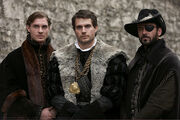
Charles Brandon (center) watches Cromwell's execution with Lord Edward Seymour (left) and Sir Francis Bryan (right) at the end of season 3.
Season 4[]
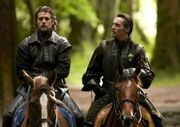
Charles hunting with the King at the start of season 4.
Charles and Henry are growing old, but are still good friends. Charles' marriage is only happy in its' appearance, but he appears to have accepted the circumstances; he and his wife are separated, although he rejects Henry's suggestion to take a mistress, saying "I'd rather make her love me again if I could". He is also good friends with Lady Anne of Cleves, whom he taught to play cards before her marriage to the King. Charles doesn't seem to know what to make of Henry's very young fifth wife, Catherine Howard, who is sweet, sexy, childish and airheaded; however, he seems glad she makes Henry happy, until her adultery is revealed in episode 4.05, which forces Charles to arrest her just as he arrested her cousin Anne Boleyn. He develops an odd friendship with the Earl of Surrey (the son of his old ally/rival the Duke of Norfolk and Katherine's cousin) which ends tragically when Surrey is brutally executed on trumped-up charges in episode 4.09. This causes a slight rift between Charles and Edward Seymour; who hated Surrey and played a role in his downfall.
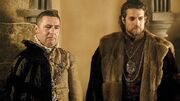
Charles Brandon with Henry Howard, Earl of Surrey.
During Henry's siege of the fortified port of Boulogne, Charles acts as commander-in-chief of the Army, directing the fire of the English cannons personally. He captures a French minor noblewoman, Brigitte (who was dressed as a man so that she could fight) and eventually falls in love with her and brings her back to England as his mistress. In Episode 4.09, Charles, like Henry, is shown to have aged considerably in a short time; he has a somewhat hostile relationship with his wife, but still loves Brigitte and his son Henry, who is perfectly aware of their relationship. Although he initially shares Henry's hope of regaining his youth and glory through battle, Charles once again becomes disillusioned by Henry's militarism, witnessing the long and ruinous siege of Boulogne- which, although successful, is costly to the point that the English cannot continue on to Paris, and ultimately the port is ransomed back to the French. Times have changed since the old days of chivalry and dueling that he and Henry grew up in.
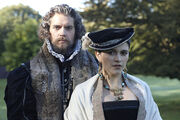
an older Charles with his mistress, Brigitte
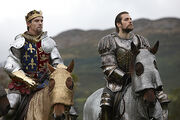
Charles and Henry lead the Royal Army at Boulogne.
In the last episode, Earl Edward Seymour of Hartford (brother of the deceased Jane Seymour and thus uncle to Prince Edward) attempts to learn if Charles will support or fight against him in the matter of Edward's succession, since Charles is known to have held Henry's favor for such a long time; Charles declines to do either, being weary of life and wishing England were more united as it once was. He also refuses to comment on the religious schism of the Church of England, but does long for the England before it all happened. Late in the episode, Charles loyally comes to visit Henry at the king's request, despite suffering from illness. Charles, and Henry reminisce about the golden days of their youth and depart. It is their last encounter; Charles dies of his illness soon afterwards while Henry mourns, as his closest friend and most loyal ally is now gone, as Henry's own health begins to fade. Brigitte and Charles's sons and staff weep at his deathbed, and his wife Duchess Catherine, decked in mourning clothes is also there, although she seems cold and aloof. Henry personally pays for Charles' funeral and burial at St. George's Chapel at Windsor.

Charles Brandon R.I.P.
Backstory[]
Charles Brandon was born in 1484 and died in 1545, a surprisingly long life span for someone of those times. His father was Henry VII's standard bearer William Brandon, who was killed while defending Henry VII from Richard III at the Battle of Bosworth Field. Charles Brandon's mother died when he was about ten and the orphaned young boy was sent to the Royal Court probably by his uncle. Since Brandon wasn't heir to an important title or great wealth, his case depended more on sentiment. He had a claim on Henry Tudor's affections since his father had died in the King's father's service. Charles was two years older than Henry VII's first son, Prince Arthur, so it is probable that they were playmates. Despite being seven years older than Henry VIII, Charles shared his most prominent characteristics- natural athleticism, robust physical health and a frequent habit of womanizing. During these adolescent years, the two boys laid the foundation for a life-long friendship. Brandon might have been the only person in England who successfully retained Henry VIII's affection for over 40 turbulent years.
Although from a Catholic background like most of England prior to the Reformation, Charles is, above all, loyal to the king. As in the series, he had a strong dislike of both the Boleyn family and Thomas Cromwell, who were some of the most powerful Protestants in England during Henry's reign. This, and the sympathy he feels towards the rebels of the Pilgrimage of Grace and the shame he feels after being ordered to go against his word and kill them, as well as his admiration for Queen Catherine of Aragon, makes Charles appear to be a tacit supporter of Catholicism. He does a sign of the cross after having the rebel leaders hanged, and when Cromwell tells him he has orders to kill innocent villagers to set an example, after doing so, he asks God for forgiveness, referring to the victims as God's flock. There is never any vocal confirmation on Brandon's true religious beliefs, only hints. He sympathizes with the death of innocent Catholics, but never has any qualms about the Protestant deaths he's caused, even his role in a machination to get a Lutheran preacher burned to death for heresy to set in motion the events that would lead to Cromwell's downfall. In the final episode, he does speak about wanting England to be as it was, but the implications there may simply be about peace and harmony and not necessarily about religion.
When Henry essentially affirms the Catholic sacraments as articles of the Church of England, for the first time Charles provides clear insight as to his religious beliefs and says the six articles are something he can adhere to with a clear conscience. The articles were also announced with punishments varying from burning to being drawn and quartered for all those who reject them. Charles smirks at Cromwell knowing of his true Lutheran beliefs, and Cromwell, in the following scene with Richard Riche, laments the articles as Catholic sacraments that will put at risk their ally and Lutheran subversive archbishop Cranmer, admitting that Henry is a Catholic at heart but simply refused to bow down to the pope on the matter with his first wife. This also gives us further insight into Henry's "Protestant" Church of England and why it may not have been so bitter a pill to swallow for most of England's closet Catholics, possibly including Charles. While just-minded, Charles was never as scrupulous to martyr himself for such beliefs. He follows orders and does whatever the king commands of him. He associates with characters of various loyalties, religious or otherwise. Despite any personal convictions, his association or enmity towards others had most to do with following orders, or opportunity, which initially tended more toward survivalism, but ultimately becomes skilled navigation of court intrigues, often conspiring with others to destroy, with perfectly orchestrated plots, a number of people he truly despised such as the Boleyn family and Thomas Cromwell.
Charles had actually been twice married (the first was annulled and the second made him a widower) before he wedded Henry's sister, Mary Dowager Queen of France, without the king's permission. He was saved from Henry's wrath mainly by the efforts of Cardinal Wolsey, who was actually quite friendly with Charles until Charles later betrayed him. After Mary's death, he married his young ward Catherine Willoughby, (daughter of Lord Willoughby and Marina de Salinas, a Spanish lady in waiting who had come to England with the young Catherine of Aragon), a marriage that ended with Charles' death in August 1545. Charles had a total of eight children from his various marriages (two daughters by his second wife, two sons and two daughters by Mary, and two sons by Catherine) as well as two bastard sons and a bastard daughter. His two sons by Mary died before adulthood; his sons by Catherine, Henry and Charles, each showed promise (with Henry inheriting the Dukedom on his father's death) but on the same day in 1551 both died from the sweating sickness.
Charles was also grandfather of Lady Jane Grey through his daughter Frances. Because she carried Tudor blood from her grandmother Mary, Jane was named heir to the Throne when her second cousin, King Edward, died; Edward did so in order to ensure that his heir would be a supporter of Protestantism, and Jane was a Reformer. Nine days after being recognized as Queen by the Privy Council and Parliament, however, Jane faced a massive uprising in support of Edward's sister Mary Tudor, and her supporters deserted her in the face of Mary's popularity; she was deposed and executed. Charles' line no longer held the Dukedom of Suffolk after his sons died without issue, but three of his daughters married into noble families and had children.
Gentility: The son of Sir William Brandon and Elizabeth Bruyn, who was the daughter and heiress of Sir Henry Bruyn of South Ockendon in Essex.
Position: A close and trusted friend of Henry VIII.
- In an interview, Henry Cavill describes Charles' major character flaw of being too much of a lothario, claiming "Charles...cannot keep his dick in his pants."
Quotes[]
- "She and I, we're married. You have to tell the King."
- "I can't tell whether you're really brave or if you're just a f*cking fool."- Margaret. "Neither can I"- Charles.
- "And tell me, will you like it when an old man makes love to you?"
- "You are drunk and you are foolish!"
- "And would you like to pay him back?"- Charles to the Queen of France. "Of course. I am a woman."- The Queen of France. "Then go to bed with me."- Charles.
- "Margaret is dead. She died of consumption."
- "My friend, If all of my courtiers were beautiful women, I would be working for my kingdom day and night."
- "To you, I will always be true."
- "When do they not lie?"
- "That woman is a whore."
- Charles: "I have to attend on Henry and that bitch of his at her coronation. Know what Wolsey used to call her? 'The Black Crow'" Catherine: "Could you not plead some indisposition?" Charles: "I could, even though the King has made me High Constable for the day- but if I did, His Majesty would remove my head, and I should be genuinely indisposed."
- Charles: (to his son Edward, who was playing with a sword) "Edward, this is not a toy." Edward: "Yes, father. Have you ever killed anyone?" Charles: "...Yes. In battle." Edward: "How did it feel?" Charles: "He was my enemy. I didn't care."
- (grabbing Thomas Boleyn and slamming him against his cell wall) "Did you watch your son die? What about your daughter- will you watch her suffer? Will you watch her die?! Tell me, Boleyn, was it all worth it?!!"
- Charles: (horrified) "I am ordered to go back to the North to kill thousands of men, women and children." Catherine: "Women and children?!" Charles: "Yes- or I will lose the King's protection and love." Catherine: "Charles- don't do this." Charles: (pause) "I don't have a choice." Catherine: (horrified) "Yes, you do! What if they were your own children?!" Charles: ... (grimly) I would still have to do it." (Catherine walks away, horrified)
- "Catherine, I do not ask for your blessing... but please, don't send me away with your curse."
- (to Eustace Chapuys) "I have a moment of nostalgia now and then, even for my enemies."
- "When she consents to make love to me again, strike a medal to commemorate it."- to Henry, referring to his estranged wife.
- "It is not easy to read the King's mind, Sir Ralph."
- Charles Brandon: "...As to religion, I have never read the Gospels and never shall. I am sure they enlighten you, but I prefer them to remain mysterious. And as to the promise of a better world, I can only say that England was merry before, and all things considered, I'd put all things were as they used to be, in times past." Edward Seymour: "Your Grace, if I do not have your support, may I ask if you will act against me?" Charles Brandon: "I'm not sure if this is any answer, my Lord Hartford... but I've always been drawn to a phrase used by the French peasants: 'Praise the God of All, drink the wine, and let the world be the world'."
- Henry VIII (on Charles Brandon, Duke of Suffolk after his death) "I will tell you this, my Lord Hartford: as long as Charles Brandon served me, he never betrayed a friend, nor ever took unfair advantage of an enemy... which is more than I can say for anyone else at my court. I never thought he would die."
